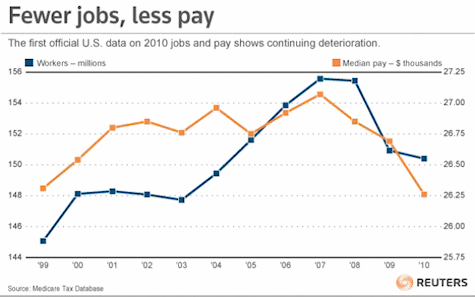Republican presidential candidate Herman Cain is winning cheers on the campaign trail for telling the poor and the unemployed that they have only themselves to blame:
“Don’t blame Wall Street, don’t blame the big banks — if you don’t have a job and you are not rich, blame yourself!”
G.K. Chesterton offered a different perspective:
“The old tyrants had enough insolence to despoil the poor, but they had not enough insolence to preach to them. It was the gentleman who oppressed the slums; but it was the slums that admonished the gentleman. And just as we are undemocratic in faith and morals, so we are, by the very nature of our attitude in such matters, undemocratic in the tone of our practical politics. It is a sufficient proof that we are not an essentially democratic state that we are always wondering what we shall do with the poor. If we were democrats, we should be wondering what the poor will do with us.”
The new tyrants, it seems, have enough insolence both to despoil the poor and to preach to them.
Here (via Mark Thoma) is yet another chart illustrating the “awful” outlook for jobs and wages in the wake of the financial crisis created by Wall Street and the big banks:
That news arrives the same day we learn that “the median U.S. wage in 2010 was just $26,363.”
Economist Nouriel Roubini looks at such data and repeats Chesterton’s question. Roubini wonders what the poor will do with us:
Firms in advanced economies are now cutting jobs, owing to inadequate final demand, which has led to excess capacity, and to uncertainty about future demand. But cutting jobs weakens final demand further, because it reduces labor income and increases inequality. Because a firm’s labor costs are someone else’s labor income and demand, what is individually rational for one firm is destructive in the aggregate.
The result is that free markets don’t generate enough final demand. In the US, for example, slashing labor costs has sharply reduced the share of labor income in GDP. With credit exhausted, the effects on aggregate demand of decades of redistribution of income and wealth – from labor to capital, from wages to profits, from poor to rich, and from households to corporate firms – have become severe, owing to the lower marginal propensity of firms/capital owners/rich households to spend. …
Any economic model that does not properly address inequality will eventually face a crisis of legitimacy. Unless the relative economic roles of the market and the state are rebalanced, the protests of 2011 will become more severe, with social and political instability eventually harming long-term economic growth and welfare.
And Lemony Snicket chimes in, skewering people like Herman Cain for having the insolence to preach at the poor …
6. Nobody wants to fall into a safety net, because it means the structure in which they’ve been living is in a state of collapse and they have no choice but to tumble downwards. However, it beats the alternative.
… and echoing Roubini’s warning to Wall Street and the big banks, for having the insolence to despoil them:
11. Historically, a story about people inside impressive buildings ignoring or even taunting people standing outside shouting at them turns out to be a story with an unhappy ending.
12. If you have a large crowd shouting outside your building, there might not be room for a safety net if you’re the one tumbling down when it collapses.













